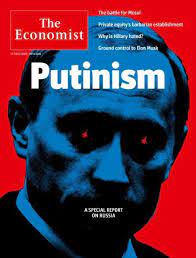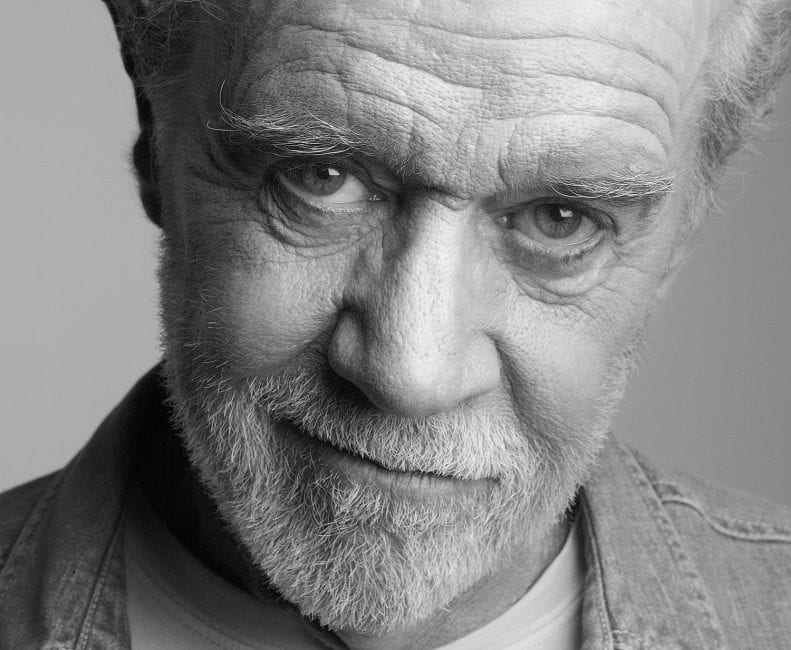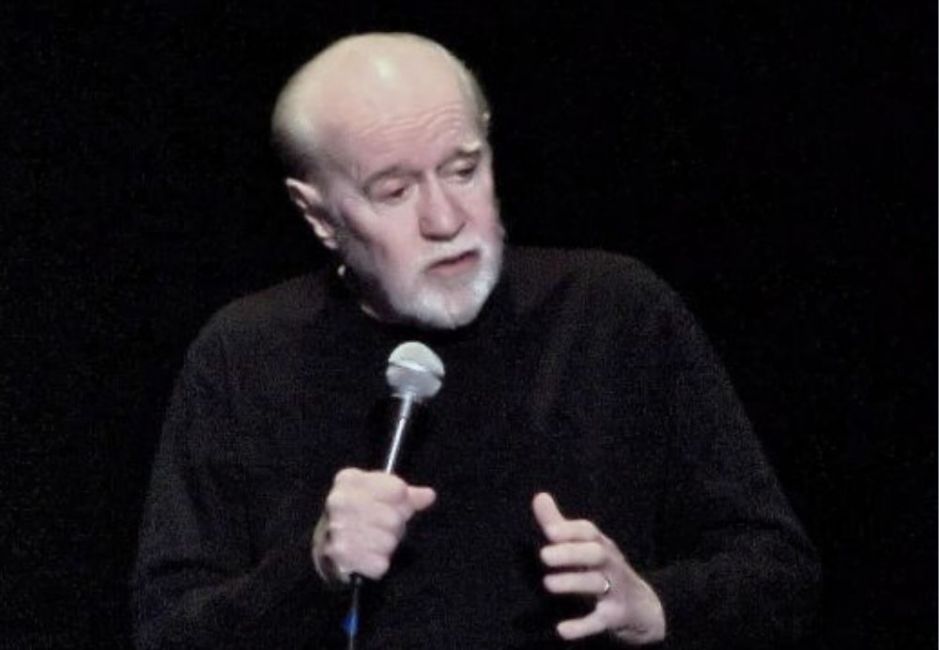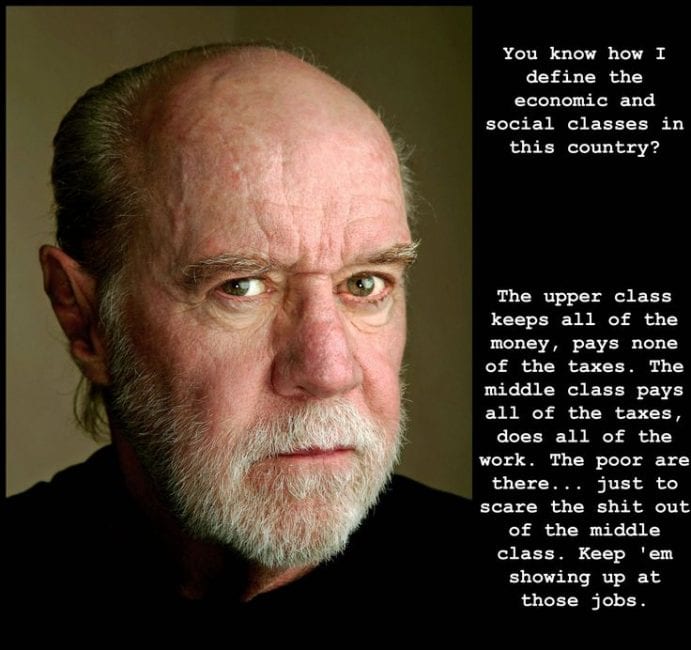Please make sure these dispatches reach as many readers as possible. Share with kin, friends and workmates and ask them to do likewise.
Paul Treanor

MILTON FRIEDMAN, one of the most famous proselytizers and practitioners of real-world libertarianism. (Via flickr)
The origins, background, values, effects, and defects of libertarianism. Some sections are unavoidably abstract, but at the end some irreducible value conflicts are clearly stated. Note that this is not intended as a formal argument with libertarians: as explained below, there are no shared premises for such an argument. If you are a libertarian, it is pointless for you to read this: go somewhere else.
THIS ESSAY WAS FIST PUBLISHED ON Mar 12, 2015
REPOSTED DUE TO LASTING INTEREST
origins
[dropcap]L[/dropcap]ibertarianism is part of the Anglo-American liberal tradition in political philosophy. It is a development of classic liberalism, and not a separate category from it. It is specifically associated with the United States, and to a lesser extent with Britain and its former 'white colonies' (Canada, Australia, New Zealand). Many libertarian authors know only North American political culture and society. They claim universal application for libertarianism, but it remains culture-bound. For instance, some libertarians argue by quoting the US Constitution - apparently without realising that it only applies in the USA. Most online material on libertarianism contrasts it to 'liberalism', but that is also culturally specific. In the USA, 'liberal' means 'left-of-centre', or roughly the left wing of the Democratic Party. Here, the word 'liberal' is used in the European sense: libertarians are a sub-category of liberals. As a political philosophy, liberalism includes John Locke, John Stuart Mill, Karl Popper, Friedrich Hayek, Isaiah Berlin, and John Rawls. As a political movement, it is represented by the continental-European liberal parties in the Liberal International.
At this point, you might expect a definition of libertarianism. However, most were written by libertarians themselves, and they are often useless. Libertarianism is freedom! is a slogan, not a definition. Besides, libertarians generally believe that market forces override individual liberty. With so many inaccurate, propagandistic definitions, I have avoided a futile redefinition. Libertarianism is described here through its values, claims, and effects.
values
The values of libertarianism can not be rationally grounded. It is a system of belief, a 'worldview'. If you are a libertarian, then there is no point in reading any further. There is no attempt here to convert you: your belief is simply rejected. The rejection is comprehensive, meaning that all the starting points of libertarian argument (premises) are also rejected. There is no shared ground from which to conduct an argument.
The libertarian belief system includes the values listed in this section, which are affirmed by most libertarians. Certainly, no libertarian rejects them all...
The idea of an implicit order —Godlike, and contained in the framework of the market—is common in libertarian philosophy.
- "process legitimises outcome"
This is an underlying belief in all forms of liberalism. All liberal societies include some form of interactive process or procedure. In turn, that has an outcome, which at least partly shapes the society: liberals see this shaping of society as legitimate. Libertarians emphasise this principle primarily in their rejection of (government-enforced) distributive justice. To libertarians, there is no such thing as distributive justice in the usual sense, what Nozick calls a 'patterned distribution'. To them, the outcome of a fair and free market is just. In fact, most libertarians believe that it derives this quality of justice, from its being the outcome of a special process (the free market, or a comparable process).
- revealing of order / perfection
One of David Friedman's books is called 'Hidden Order: the Economics of Everyday Life'. The idea of implicit order is common in libertarian philosophy. The simplest claim is that a hidden order or logic in the world is revealed through the workings of the market. To varying degrees, this order is then considered sacred: and indeed it is originally a religious doctrine. It comes to libertarianism through the conservative-liberal tradition in Europe, and it has its origins in mediaeval philosophy. The most famous metaphor of the free market, Adam Smith's 'invisible hand' is part of this tradition. In the original religious version, the hidden order is seen as the work of God, and it is revealed in the social world of human interactions. Modern secular versions do not see order as pre-existing, in this sense. They speak of 'self-organising' or 'emergent' orders, but the quasi-religious emotion is still there - the sense that something more perfect is revealed. This aspect of libertarianism has cross-connections to New Age and spirituality.
- world of emergence
Libertarians attach great value to the outcome of process: it defines the ideal libertarian world. The liberal tradition generally is hostile to utopias, seeing them as attempts to enforce an ideology. Liberals share this aversion with some postmodernists, who see a direct line from European utopian thought to Auschwitz. However, libertarians are an exception to this pattern of hostility. They often have a utopian political style, not hesitating to describe their 'ideal society' (at least, a version set in the USA). This society is usually seen as the result of libertarian process, not the process itself. For example, the libertarian utopia is not simply 'less government', it is what emerges after 25 years of less government. It is not relevant to say that libertarians have 'got their predictions wrong', and that something else would happen. The point is, that libertarianism does have an ideal world, which it intends to substitute for other possible worlds. Inherently, it must then defend this world's existence. And if the absolute free-market had totally unexpected effects (such as a Bolshevik world government), then most libertarians would interfere with its workings, to reinstate their intended ideal world. In other words the libertarian utopia is not a prediction of the effects of libertarian politics, it is a stand-alone utopian vision. It is defined as emergent (or in similar terms), and perhaps it is emergent, but the relevant fact is that libertarianism generally operates under the equivalence "the emergent = the good". By being 'emergent' it is for libertarians a world more perfect, than any ideal city of the European Renaissance. And therefore, it "must" come to existence, and it "must" exclude other existence. Libertarianism can not be understood without understanding this preference, and its emotional depth.
- Darwinism
The Darwinism of libertarians is an example of their preference for a particular future world. Most libertarians support competitive interaction in a Darwinist form - Darwinist in the sense that some entities may disappear, in the process of competition. In the free market, products which fail to secure a market niche, are no longer produced. A short pro-libertarian essay by David Friedman is about 'bad trucks' - trucks made in the Soviet Union. As Friedman says, "The capitalist truck was built under a system of institutions in which people who build bad trucks are likely to lose money". So in the end, no more 'bad trucks' will be built, and Friedman sees nothing wrong with that. For him, and many other libertarians, it is self-evident that certain things are 'bad': they deserve no existence, and society should be designed to punish them out of existence. Selective competition is the instrument, disappearance of 'bad trucks' is the result, and this result is explicitly desired. Even without an explicit reference to Darwinian evolution, this obviously leans on the success of Darwinism as a social metaphor. This is an important issue for the philosophical legitimation of libertarianism. If the market has evolutionary effects, or indeed any predictable selective effects, then it can no longer claim to be a 'neutral set of rules and procedures'.
- utilitarianism:
Many libertarians are social utilitarians. Simply stated, they believe that the benefits for the many outweigh the disadvantage for the few. Phrases like "most people would prefer" are common in libertarian texts. Libertarians may concede that poverty will not disappear, some concede that the poor will be much worse off, or even starve. They justify this in terms of classically utilitarian approaches. The 'trickle-down effect' is a familiar example - the claim that "if the rich get richer, then some of the money will reach the poor eventually". Here too is a specific philosophical belief, in this case the very clearly defined philosophy of utilitarianism. Libertarians who propose a society on this basis, would necessarily impose their ethical doctrine on others. It is not possible to have a 'value-neutral utilitarian society', any more than a 'value-neutral Catholic society'. Libertarians who insist on utilitarianism as a social value, can not claim to support individual freedom with respect to philosophical beliefs.
- collectivism:
Despite the claimed horror at 'collectivism', libertarians share the general liberal preference for collective forms of decision-making - above all, the market. This is often legitimised by a claimed universal necessity, to 'balance' or 'weigh' preferences. This is an ancient metaphor, and very popular since Newton, but the 'necessity' is not self-evident. No-one can show why preferences should be balanced, or weighed: to want them weighed or balanced is a preference in itself, and by definition a preference for collectivism. In practice, free-market decisions are always collective: supply of one product, by one maker, to one customer is not a free market. A free market in the libertarian sense needs at least three parties: with only one buyer and one seller there is no competition. In a free market with multiple parties and mutual competition, all parties influence the final state of affairs. No individual can decide that outcome alone. While claiming to reject autocracy, libertarianism has in fact abandoned autonomy.
- 'interarchy': are libertarians minarchists?
Some libertarians describe themselves as anarcho-capitalists, or simply anarchists, or minarchists. Anarchy means literally 'no rule' and minarchy implies minimal rule, minimal government. Robinson Crusoe, alone on an island, could claim to have a truly minarchic and anarchist system: absolute autonomous self-government. However, isolation is not what libertarians mean when they use these terms. The political structures proposed by libertarians allow any person to interact with another, in any non-coercive way. Libertarianism, and liberalism in general, recognise no 'right to be a hermit'. But most libertarians not only allow interactive society, they positively value it. They claim it allows knowledge to be shared: they value this input of others. Not just in their own life, but as a general social precept. This high-interaction society, of collective decision making, already has a name: Hayek suggested 'catallaxy'. However, the term 'interarchy' seems better. It indicates that no-one in such a society is 'self-governing' in the Crusoe sense. Others affect their lives: in a global economy, about four billion other adult consumers, and millions of business firms. If minarchy means minimal outside influence on the life of the individual, then libertarians are not minarchists. By the same token, they can certainly not be anarchists.
- connectionism
This term is used in cognitive psychology, for a model of the mind based on neural networks. However there is also a normative connectionism, familiar from early Internet activism - the idea that connections are good in themselves. That ideology of the fully interconnected global society, the 'wired world', inspired many activists. (Ironically, it often inspired them to demand government action to wire the world). However, connectionism in itself pre-dates the Internet. Probably every improvement in communications technology over the last 200 years, has led to connectionist declarations. In libertarianism, connectionist beliefs underlie the libertarian preference for a global (trading) economy.
- syncretism
The syncretism of libertarianism is also best visible among cyber-libertarians. Syncretism means literally a belief in the value of fusion and intermixture, especially between religions. For some liberals (in the general sense, including libertarians) the mere fact of connection is not enough, - they value the cultural and social fusion it produces. Religious and ethical syncretism have existed for thousands of years, although they never produced a global religion. The early Internet hype led to a minor revival of syncretism, which had been confined to a New Age minority. One particular form of syncretism attracts support among libertarians: organic pan-syncretism - the ideal of human society as a global organism, fused from existing societies. This obscure ideal was dramatically revitalised by claims that the Internet could make a 'global brain' technically possible. It apparently has a deep emotional appeal for some libertarians: they see in the interactive nature of the free market a forerunner of a planetary organism. The theorist David Friedman, a hard economic libertarian, links from his homepage to the SF novel Earthweb, which in turn credits him as an inspiration. Alexander Chislenko's Hypereconomy is an example of how free-market 'individualism' can imply extreme organic collectivism.
- unity
Even for those who do not dream of immersion in a global brain, unity has political appeal. The importance of a global economy for almost all liberals (not just libertarians), is an indication of that. "One world!" is an immensely powerful slogan: it appeals to left and right - even to people who support all kinds of secessionist movements. Again, the libertarian version of global unity is generally the options-exchange version: global financial trading, absolute free trade, and sometimes free global migration. (However, US libertarians are cautious, evasive and non-emphatic, about free immigration). But certainly, most libertarians would reject the idea of a divided world: a libertarian half-planet is not enough for them.
- expansionism:
Most libertarians want to live in a libertarian world: unfortunately, they think that the rest of us should also live there. Most liberals take a similar view. Unlike libertarians, mainstream liberal-democratic governments have armies to enforce it. Libertarians believe that to impose freedom is not an imposition. For them, anything which can legitimately be described as 'freedom', may legitimately be imposed. The Libertarian FAQ, for instance, says "America's free press is envied by freedom-starved people everywhere": implicitly, to allow any other press would be a denial of freedom. In this logic, imposition of a political ideology is a generous response to the suffering of others, who are 'starved' of it. The climate of global politics is increasingly interventionist anyway. If US libertarians become less isolationist, they might demand that the US Marines bring the 'gift of freedom' to Africa and Latin America.
the claims and self-image of libertarianism
Libertarians tend to speak in slogans - "we want freedom", "we are against bureaucracy" - and not in political programmes. Even when they give a direct definition of libertarianism, it is not necessarily true.
BELOW: Poster reflecting widely-held feelings about savage capitalist rule as implemented according to the theories of free-marketers like Friedman.
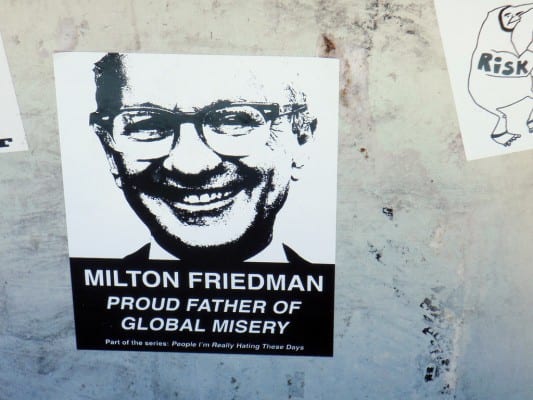
- non-coercion:
The principle of non-coercion, or non-initiation of force, appears in most self-definitions. It is the equivalent of the liberal concept of 'negative liberty' and some libertarians use that term. Libertarians say they are against coercion, but they support the free market. The introduction of a free market in Russia after 1989, lead to an excess mortality of about 3 million people. I call that force (and not defensive or retaliatory force): libertarians do not. Some US employers require their employees to smile at all customers, or lose their job. I call that coercion: libertarians call it freedom of contract. There is no point in further discussion of these issues: they are examples of irreconcilable value conflicts.
- moral autonomy:
Libertarians claim to value the moral autonomy of the individual. However, in the free market which they advocate, there is no connection between individual action and social outcome. A one-person boycott of meat will not stop the slaughter of animals. In reality, the individual is powerless in the face of the market - and without some decision-making power there is no real moral autonomy. The implicit position of most libertarians is that this must be accepted - that the outcome of the market is morally legitimate, even if it does not correspond to the conscience of the individual. Certainly, all libertarians distrust even limited interference with the market: many reject it entirely.
- political freedom:
Libertarians say they favour political freedom. But even to simply enforce the outcome of the market, the apparatus of a state would be necessary - an army to prevent invasions, a police force to suppress internal revolt, a judicial system. Most libertarians go much further: they want a libertarian regime. Some of them have written complete and detailed constitutions. But like any state, a libertarian state will have to enforce its constitution - otherwise it will be no more than a suggested constitution. Even if the state is founded on the planet Mars (as some libertarians suggest), someone else with different ideas will probably arrive sometime. The libertarian constitutions might work in a freshly established libertarian colony, inhabited only by committed libertarians. But sooner or later there will be an opposition, perhaps resolutely hostile to the founding principles. States, which fail to enforce their own political system against opposition to the state itself, ultimately collapse or disappear. If libertarian states want to survive in such circumstances, they will use political repression against their internal opponents.In the case of libertarianism within existing states, the position is much clearer. There is no question of a fresh start with a fresh population. The Libertarian Party of the United States, for instance, seeks to impose a libertarian system on the United States. It is an imposition, and can not be anything else. Unless they are prepared to accept the division of the country, they will have to deal with millions of anti-libertarians, who reject the regime entirely. They might call the riot police the Liberty Police, they might call the prisons Liberty Camps, but it's still not 'political freedom'.
- instrumental claims:
Libertarians often make many instrumental claims - claims that their system would produce desirable results. Arguing from results is not generally considered sufficient to justify a political philosophy. (The attitude of British and American fascist sympathisers was caricatured in the expression "Mussolini made the trains run on time"). Most libertarians favour a drastic deregulation and full privatisation of the economy, and this is typically where the instrumental claims are made. The libertarian reforms will, they claim, improve education and medical services and make better and cheaper products available. Similar claims are made by almost all liberals. However, like David Friedman's 'bad trucks' argument, they rely on a value judgment.There is no neutral common standard of what is good and bad, in consumer goods or education. Different economic systems and different societies produce different types of goods and services. Libertarians implicitly claim that their preferences are the right preferences, and that the economic system itself should be chosen to produce their preferred goods and services. They don't want Soviet-style goods in the shops, so they want a non-Soviet system. Perhaps you don't want Soviet-style goods in the shops either. The point is: did they ask you?All instrumental arguments are paternalistic. The fascist sympathisers who praised Mussolini's train timekeeping, assumed that was the most relevant factor to judge Italian fascist society. For themselves - but also for their listeners. Libertarians assume everyone wants an American-style economy directed to consumer goods. Some people do. But other people have different tastes, and different priorities. Libertarians ignore these differences, and simply assume that everyone wants exactly the same, from the economy, from health care, from the educational system. That paternalism is incompatible with the moral autonomy and economic freedom, which libertarians claim to promote.
That is an inconsistency in libertarian claims to political power. It is a separate issue from the accuracy of their predictions about the wonders of deregulation and privatisation. If libertarians say, for instance, that global deregulation will lead to increased electricity production in Ghana in 2050, there is no point in discussion. No-one knows anyway. The instrumental arguments of libertarians are untested, since no country has a fully libertarian economic system. There are partial neoliberal and libertarian 'experiments' - deregulation and privatisation. But, as the Californian electricity crisis showed, if the experiment fails, its supporters will simply claim that it was not sufficiently neoliberal or libertarian. So even the evidence for the instrumental claims of libertarians is a matter of interpretation and preference: it would be futile to use it as a basis for discussion.
- "choose us or choose Hitler":
Perhaps it is no more than a style of argument, but a 'dual world' is a feature of many libertarian texts. On one side is libertarianism, on the other totalitarianism and dictatorship. The historic examples cited are almost always Nazism and Stalinism, the historic figures are Hitler, Stalin and Pol Pot. If it is not just a style of argument, then it is a specific form of utilitarianism: the legitimation of libertarianism by the (presumed) prevention of the horrors of totalitarianism. That would imply a libertarian claim, that even if libertarian society is unpleasant for everyone, they should accept it - to avoid the Gulag. As a style of argument this is very common, but it is hard to judge whether its users seriously think that there is a 'two-way switch' built into recent history.
- specific position in the USA:
Here too, it is hard to judge how far libertarians have identified themselves with the USA. Certainly libertarianism is a largely North American phenomenon, and European libertarians are usually Atlanticist. But the question is, whether the USA is the promised land for libertarians - the only possible location of their libertarian revolution. And if it is, would they accept a strategy of 'libertarianism-in-one-country'? Libertarianism is ultimately a universal ideology: that implies that a libertarian USA would become a vehicle for global libertarianism. In other words, when the USA went libertarian, libertarians would proceed to an expansionist war of conquest. However, I have never seen such a proposal: in fact US libertarians seem only vaguely aware that there is anywhere outside the USA.
The differences between libertarian image and libertarian reality are summarised in this table.
| libertarian image |
libertarian reality |
| Image: non-coercion, no initiation of force |
Reality: libertarians legitimise economic injustice, by refusing to define it as coercion or initiated force |
| Image: moral autonomy of the individual |
Reality: libertarians demand that the individual accept the outcome of market forces |
| Image: political freedom |
Reality: some form of libertarian government, imposing libertarian policies on non-libertarians |
| Image: libertarians condemn existing states as oppressive |
Reality: libertarians use the political process in existing states to implement their policies |
| Image: benefits of libertarianism |
Reality: libertarians claim the right to decide for others, what constitutes a 'benefit' |
political structures in a libertarian society
Values do not enforce their own existence in the social world. The values of libertarianism would have to be enforced, like those of any other political ideology. These political structures would be found in most libertarian societies....
- non-coercion creates veto right:
Libertarians, as indicated above, emphasise the principle of non-coercion. Many libertarian propaganda texts begin by stating the principle. The Non-Statist FAQ says:...libertarianism is the ideology that aggression is bad. In libertarian argot, 'aggression' is defined as the initiation of coercion, and 'coercion' is defined as force, fraud or duress; coercion exercised in self-defense or restitution is defined as retaliation, not initiation.And Charles Murray writes in What it means to be a Libertarian (p. 6):
It is wrong for me to use force against you, because it violates your right to control of your person....I may have the purest motive in the world. I may even have the best idea in the world. But even these give me no right to make you do something just because I think it's a good idea. This truth translates into the first libertarian principle of governance: In a free society individuals may not initiate the use of force against any other individual or group.
Now it is logically inconsistent, to demand a 'noncoercive principle of governance'. Unless someone (coercively) enforces it, it will be meaningless. And libertarians have a narrow and specific definition of coercion anyway (see below). But leaving that aside, this principle has an important political characteristic. It carries an implicit secondary claim, that any veto on coercion is legitimate.
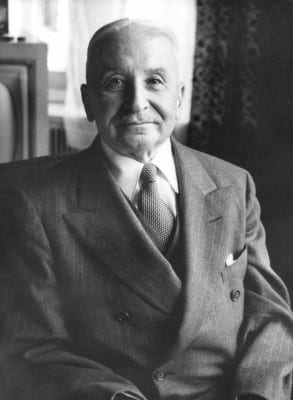
Ludwig von Mises: one of the early libertarian prophets. Scion to a Jewish fortune, of Austrian descent, he held absolutistic views about "freedom." (Public domain)
[dropcap]I[/dropcap]n a libertarian world, any person could exercise a veto over any project, if it required their coercion. And as protesters have discovered, you can place yourself in a position where that coercion is required. In other words the non-coercion principle is a licence for deep NIMBY-ism. By literally or metaphorically 'sitting in front of the bulldozer', any project can be blocked. To evade this, libertarian theorists would have to create exemptions to the non-coercion principle, and probably exemptions from these exemptions. I have not seen any libertarian attempt to do this. However, there is a good comparison with rights theory - where every right can be matched by a claimed counter-right. In political practice, this has led to an inflation of rights (which can also be found in some libertarian proposals). The creation of a de facto veto right, or a specific set of exemptions from it, would undermine claims that the proposed society is a neutral set of rules and/or procedures.
- selective benefit from the non-coercion principle:
There is no self-evident way to apply the non-coercion principle: it must be applied to someone or something. The question is, to what, to whom? This is the problem which rights theorists faced, when people started claiming rights for animals, for species, for ecosystems, for land, and for rocks. The non-coercion principle also has a limits problem. May fish legitimately be coerced into nets? Is it coercion to demolish a building? May collectivities benefit from non-coercion? In other words, is the principle of non-coercion exclusive to natural persons? Some libertarians do say that, but even this is unclear. Libertarians can not agree on whether an abortion is initiation of force, because they disagree on whether the fetus is a natural person.Certainly libertarians insist that the State should respect the non-coercion principle. Some libertarians might concede that the State is also protected by the principle, especially the so-called minarchists. For instance, they might condemn extortion from the government as coercion, force or fraud. If they concede the existence of a government at all, it will need protection against force in order to function. But if they concede this extension, why not extend it further to clubs and associations, which also need protection in order to function? Or to ethnic minorities? Or to species? A libertarian society needs to define the limits of the non-coercion principle, in order to apply it. These limits must then be enforced. Once again the claim to neutrality is undermined. The libertarian state would have to be maximal enough, to enforce their particular view of who deserves non-coercion.
- market forces not defined as coercion:
Imagine a world where coercion (or initiation of force) is indeed forbidden, and everyone accepts that prohibition. In such a world, power would rest with those who define 'coercion' or 'initiation'. The Libertarian Party Principles state:We hold that all individuals have the right to exercise sole dominion over their own lives, and have the right to live in whatever manner they choose, so long as they do not forcibly interfere with the equal right of others to live in whatever manner they choose.In other words, interference with the lives of others is permitted, so long as it is not forcible. Anti-coercion libertarians do not simply oppose coercion, they also claim to legitimately define it. Their definition excludes much that others would see as coercion.
Most explicitly, market forces are not defined as coercion by libertarians. Some take this to extremes - proposing for instance a free market in children, or the return of indentured labour and contract slavery. On the other hand, any attempt to restrict market forces (or competition) would be defined by most libertarians as 'coercion'. Yet again the claim to neutrality is undermined: the libertarian state would also enforce their particular views of what constitutes non-coercion.
First of all, libertarianism is a legitimation of the existing order, at least in the United States.
Cynically defined, a libertarian is a person who believes that all humans should live in total and absolute submission to market forces, at all times from birth to death, without any chance of escape. Only liberal ideologies claim that living in a free market is equivalent to living in a free society. Charles Murray writes in What it means to be a Libertarian (p. 6):
Formally stated: A voluntary and informed exchange benefits both parties. This characteristic of a voluntary and informed exchange makes a free society possible.
No, it does not. There is a huge gap in the logic here. The characteristics of the exchange do not determine the form of the society in which it takes place. A society is not a two-person transaction. A voluntary and informed exchange between two parties may already have dramatic consequences for a third party. Billions of free-market transactions result in some 'third parties' starving to death: that is neither voluntary, nor informed, nor an exchange.
A simple example: two islands exchange crops, to reach a minimum healthy diet. Soil conditions mean that a full range of crops can not be grown: without the exchange the inhabitants of both islands will die. Then an external trader arrives, and sells the necessary crops to one of the islands. The trader sells honestly at fair prices: both parties (trader and one island) are satisfied with the deal. Nevertheless, the inter-island exchange ends. On the other island, the population dies of malnutrition. Obviously, they never contracted to this, yet some libertarians would claim that they are in some sense more free.
To allow 'freedom' in the sense that no-one finds themselves in a non-consensual condition as a result of transactions, would require
- the effect on all persons is known (predictability), or at least the risks to all persons are identified
- all those affected are informed, and
- all those affected consent.
Even in a small village with a barter economy these conditions are impossible. they are certainly impossible in a global economy. Libertarians must know that free markets are not 'pure' transactions in a social vacuum. The voluntary and informed nature of a contract can, in reality, never extend beyond the contracting parties. But its effects can. Even if every single transaction is voluntary and informed, the resulting society might disadvantage everyone. If, and only if, all its members have contracted to accept any and all outcomes of all transactions collectively, can it be a 'free society' in the sense implied by Charles Murray. Otherwise, the image of the voluntary transaction as a metaphor for society, is false and propagandistic.
- existing world not defined as coercion:
Liberal political philosophy often has a hidden preference for the existing world, concealed within apparently neutral structures. In libertarianism, it is found in the non-coercion principle. Since humans have not freely chosen the world into which they were born, a truly non-coercive philosopher would demand that the cosmos disappeared - and only re-appeared, when everyone consented in writing to its existence. The real world is not so helpful. Libertarians take the existence of existing society as given. That makes it unfairly privileged - since attempts to abolish it can be legitimately described as coercion. In other words it gets a head start over all possible other societies: they have to prove 'non-coercion' before coming into existence, the existing society does not.Libertarians appear to reject destructive force in general, including the destruction of tradition, and of traditionally venerated objects. Prohibiting the destruction of the existing is, by definition, a form of conservatism. Libertarianism appears to be 'anti-iconoclastic' in this sense, but specific libertarian condemnations of revolutionary iconoclasm are hard to find.
- selective anti-moralism:
Libertarians do have values (see above). Nevertheless, like most liberals, libertarians not only claim to be value-neutral themselves, they explicitly promote value neutrality. The standard model of human rights is a classic example of liberal value neutrality. The whole point about human rights is that they are universal - and therefore deliberately amoral. Good humans and evil humans get equal human rights: the rights are equally valid when used for good or evil.Some libertarian philosophy rejects all moral judgment. No statement, it claims, can be more than an opinion. Almost all libertarians claim to reject the imposition of values by the State and other external authorities. They reject personal moralising, for example interference in the sex life of individuals by religious groups. Since libertarianism is so concentrated in the USA, school prayers, pornography, abortion and gun control are the typical issues.However, ethics is not only about adult videos: there is a huge range of fundamental moral issues, submerged beneath the consensus of western societies. Almost by default, existing nation states impose some moral values, and reject others. Some of these have never even been discussed: academic philosophers find new ethical issues every day. Very few are the subject of the 'ethics controversies' debated by US libertarians and their opponents. So the opposition of libertarians to 'government moralising' can only be selective - and it is in practice selective. That obscures the position of libertarians, on moral issues that are notconstantly in the US media. US schools also teach the benefits of the free market, and libertarians don't complain.
effects
The effects of a libertarian world flow from the values it enforces.
- conformity:
A free market (or the comparable electronic structures envisaged by techno-liberals) exercises social forces. It is true that individuals can offer some resistance to social forces, but absolute rejection of all values and trends in the surrounding society is impossible. So there is always some reduction in individual freedom through 'interarchic' effects. In a free market, the individual consumer does not have 'freedom to choose': the freedom can only be exercised collectively. However, those consumers whose choice coincides with the outcome of market forces, are rewarded. The others are not only the losers on the market, but then also face market pressure to adapt their choice. In general, average-taste choices benefit. Free markets are not simply collective, but do have a centring effect.
This quote from Eric Raymond (original now offline) sums up the libertarian attitude:As for whether open-source is 'techno-libertarian' -- well, I invite you to note that there is no coercion in it anywhere. It's a pure example of voluntary cooperation in a free market. The fact that open-source development leads to mostly cooperative rather than mostly competitive behavior is consistent; market economies are the most marvelous cooperative engines ever.That is why markets are wrong: they produce social and technological uniformity. They 'centre' society. However, for some libertarians, that is exactly what makes them right.
- imposition of a specific world order
As libertarian constitutions emphasise, a libertarian world is not a free-going world. It is an extremely specific world, in fact a specific world order of states of a specific type. (Most libertarian constitutions assume a world of multiple states). Libertarians may call these states 'minimal', but their individual specification would be extremely rigid. So too, probably, the relations among them, although I know of no proposals for a libertarian UN. In other words, if the Martians landed, they would know at once that they were on a libertarian planet. (Probably, they would be charged a landing fee). Libertarians can not see this specificity as a defect: because it specifies the world that they want, that they believe to be right. And indeed for them it is no defect: but for non-libertarians it is.
- "process legitimised this outcome"
Since libertarians generally believe that process legitimises outcome, a libertarian society will tend to accept any outcome as legitimate. Specifically, a libertarian society will tend to see itself as legitimate - since it guarantees libertarian process, and is itself the outcome of that process. This is a potential licence for injustice. It is already common practice in liberal societies to legitimise social inequalities, by reference to the 'equal opportunities' which were available. (Usually they were not, but this political tactic forces critics to first prove they were not).
- glorification of the order revealed through process
For libertarians, the social order which comes into existence through market process (and comparable process) has a special value. In cyber-liberal terms, it is the 'emergent order'. In a fully libertarian world, the veneration of this order would be an important cultural feature, at worst amounting to sacralisation. Certainly libertarians vehemently reject attempts to interfere with the wealth distribution resulting from the market. They clearly feel that something valuable would be destroyed. If this sort of veneration or sacralisation applied to the society as a whole, it would have a paralysing conservative effect. It would equate innovation with sacrilege, creating a taboo on destroying the 'sacred and perfect' order.
- exclusion of entities from the post-emergent world
The perfect libertarian world would contain only entities which were the product of market forces: it would be post-emergent. Nothing would exist which had not been through the filter of emergence. The more libertarian the society, the more closely it would approach this state of affairs. In general, in a libertarian society, only goods and services would be available which conformed to market forces. Primarily, those would be the products of private enterprise. Some charities might also exist, but only if they successfully marketed themselves.In other words certain entities will be permanently missing from the libertarian world. To libertarians, that is an advantage: they think of these entities as wrong: wrong as a product of coercion, or just plain wrong, like David Friedman's 'bad trucks'. Not just bad trucks will be missing, but an entire range of 'bad' entities, from 'bad' pencils, to 'bad' organisations, to 'bad' cities.Urban planning theory has an established rhetoric of rejection of the 'Soviet City', the 'bad city' which is contrasted with the US city. It is a specific example of the contra-utopianism of liberal thinking. Sometimes you can imagine the theorist shouting at, for instance, Kaliningrad: "Such a city must be forbidden!" The point is that not everyone shares this preference of mainstream urban theory: and not everyone shares David Friedman's conviction that American trucks are self-evidently good. The entire range of 'bad entities' in this sense, is no more than a list of the personal preferences of libertarians.
- Darwinistic society generates evasion:
Attempts to introduce intermediate stages, on the road to a libertarian society, emphasise privatisation and competition in government. Libertarians generally favour this approach. However, introduction of markets or quasi-markets may not produce the predicted aggressive goal-oriented competition. Students know this well: a university is the most competitive institution most of them will ever experience. And students know what they do, or at least what other students do, in such circumstances. They cheat. So do cadets at military academies, which make a cult of performance under pressure. So do Olympic athletes. If society was run to the high-achievement standards of the international derivatives market, one probable result is a new mass culture of evasion.
what is libertarianism?
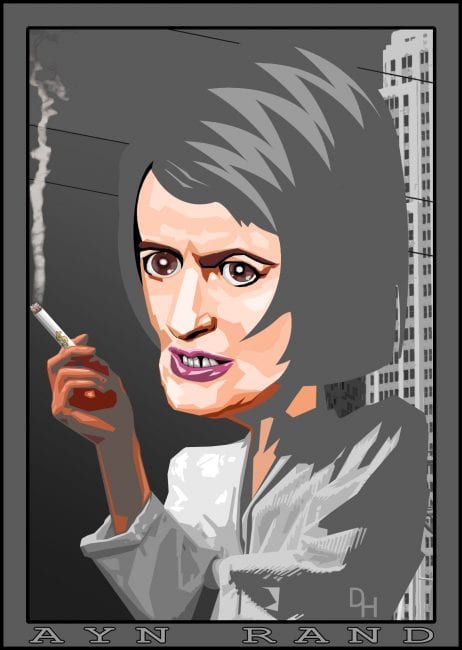
Ayn Rand: Spurious philosopher and ruthless disseminator of the "freedom cult." (Via DonkeyHotey, flickr)
[dropcap]W[/dropcap]ith the values and effects listed above, the general characteristics of libertarianism can be summarised.
Firstly, libertarianism is a legitimation of the existing order, at least in the United States. All political regimes have a legitimising ideology, which gives an ethical justification for the exercise of political power. The European absolute monarchies, for instance, appealed to the doctrine of legitimate descent. The King was the son of a previous King, and therefore (so the story went), entitled to be king. In turn, a comprehensive opposition to a regime will have a comprehensive justification for abolishing it. Libertarianism is not a 'revolutionary ideology' in that sense, seeking to overthrow fundamental values of the society around it. In fact, most US libertarians have a traditionalist attitude to American core values. Libertarianism legitimises primarily the free-market, and the resulting social inequalities.
Specifically libertarianism is a legitimation for the rich - the second defining characteristic. If Bill Gates wants to defend his great personal wealth (while others are starving) then libertarianism is a comprehensive option. His critics will accuse him of greed. They will say he does not need the money and that others desperately need it. They will say his wealth is an injustice, and insist that the government redistribute it. Liberalism (classic liberal philosophy) offers a defence for all these criticisms, but libertarianism is sharper in its rejection. That is not to say that Bill Gates 'pays all the libertarians'. (He would pay the Republican Party instead, which is much better organised, and capable of winning elections). Libertarianism is not necessarily invented or financed by those who benefit from the ideology. In the USA and certainly in Europe, self-declared libertarians are a minority within market-liberal and neoliberal politics - also legitimising ideologies. To put it crudely, Bill Gates and his companies do not need the libertarians - although they are among his few consistent defenders.
Thirdly, libertarians are conservatives. Many are openly conservative, others are evasive about the issue. But in the case of openly conservative libertarians, the intense commitment to conservatism forms the apparent core of their beliefs. I suggest this applies to most libertarians: they are not really interested in the free market or the non-coercion principle or limited government as such, but in their effects. Perhaps what libertarians really want is to prevent innovation, to reverse social change, or in some way to return to the past. Certainly conservative ideals are easy to find among libertarians. Charles Murray, for instance, writes in What it means to be a Libertarian(p. 138):
The triumph of an earlier America was that it has set all the right trends in motion, at a time when the world was first coming out of millennia of poverty into an era of plenty. The tragedy of contemporary America is that it abandonned that course. Libertarians want to return to it.
Now, Murray is an easy target: he is not only an open conservative, but also a racist. (As co-author of The Bell Curve he is probably the most influential western academic theorist of racial inferiority). But most US libertarians share his nostalgia for the early years of the United States, although it was a slave-owning society. Libertarianism, however, is also structurally conservative in its rejection of revolutionary force (or any innovative force). Without destruction there can be no long-term social change: a world entirely without coercion and force would be a static world.
the real value conflicts with libertarians
The descriptions of libertarianism above are abstract, and criticise its internal inconsistency. Many libertarian texts are insubstantial - just simple propaganda tricks, and misleading appeals to emotion. But there are irreducible differences in fundamental values, between libertarians and their opponents. Because they are irreducible, no common ground of shared values exists: discussion is fruitless. The non-libertarian alternative values include these...
- coercion not an absolute wrong:
The libertarian claim, that freedom from coercion is the supreme social value, is simply wrong (leaving aside their own inconsistency about force and compulsion). Non-coercion is not the absolute good: other values override it. For instance, other things being equal, it is not wrong to secure justice by coercion. And when the alternative to coercion is non-innovation, then coercion to secure innovation is also legitimate.
- ideals should not be abandoned simply because they involve some coercion:
The European Union and the Council of Europe have both prepared spatial plans for Europe. I don't agree with their versions, but a plan in itself is a good idea. They are wide-ranging documents, shaping the future of 700 million people on 10 million square kilometres. Inevitably, some people will suffer compulsion, in the implementation of such a comprehensive plan. For instance, although no-one will be sent to the Gulag, their land might be compulsorily acquired. Libertarians reject even that level of coercion. They reject the whole idea of such a huge plan: they think that any state planning is wrong. So, they say, the idea should simply be abandoned: "leave it to the market". But there is no reason to simply abandon any broad and complex ideal of the future of Europe. Grand ideals are not inherently wrong - and they are not made wrong, simply because their fulfilment requires a degree of coercion.
- redistribution of wealth is not wrong:
Libertarians argue as if it was self-evidently wrong, to steal the legitimately owned property of the rich, and give it to the poor. But it's not wrong, not wrong at all. Redistribution of wealth is inherently good: in fact, it is a moral obligation of the state. Excessive wealth is there to be redistributed: the only issue is what is 'excessive'. And of course this is coercion, and of course Bill Gates would scream 'Tyranny!' if the government gave his money to the poor of Africa. But it's still not wrong, not wrong at all.
- people are not absolutely entitled to keep the money they earned:
Labour creates no entitlement to property. The claim that is does is merely a culturally specific preference: the labour theory of value - ironically a pillar of Marxist theory. Other cultures might claim that God's grace, or piousness, or filial devotion, or patrilineal descent, or status, create the entitlement to property and wealth. There is no objective standard by which these claims can be ranked. On this issue, you say what you choose to believe. I say the state should tax those with more than an acceptable minimum income. But what if they are the creators of wealth, and they refuse to create when they are taxed? Well then let us all live in poverty, and let us imprison them, for trying to blackmail the state into lowering their taxes. It's simply political bluff, for a particular group to claim that they are the 'creators of wealth', and that the rest of the population owes them obeisance for this reason. In all probability, not much will happen to the Gross National Product, if the self-styled 'creators of wealth' lose their privileges.
- the State is not wrong:
Anti-statism is a central element of libertarianism, but it rests on no foundations, other than the libertarian principles themselves. Often, libertarians suggest that 'The State' (the government, in American usage) is inherently wrong. But even if they say that explicitly, it is simply their belief, that's all. By its nature, the state uses coercion of the type that libertarians oppose, but that is not inherently wrong either (see above). In return, the state can end coercion of the type that libertarians tolerate and welcome, especially in the free market. And the State is, almost by definition, the only means to implement large-scale change and innovation in society - as opposed to simply letting market forces shape the future.
- moral values are above the law:
US libertarians often complain that "the government is above the law": they oppose an entity with this status. The most extreme libertarians see the government (tax officials especially) as a gang of armed robbers: they see the courts as the remedy for this. In fact, most liberals support the 'rule of law', the Rechtstaat-liberals see it as central to liberalism. In practice, the rule of law would probably mean the rule of lawyers and judges: the courts would become the State, and exercise its functions. But the principle is wrong in itself. Certainly, if libertarians flatly state that "nothing should be above the law", then they are flatly wrong. The law is not the supreme moral value: it is not a moral value at all. The law must defer to moral values: they are indeed 'above the law'.
the alternative: what should the state do?
The fundamental task of the state, in a world of liberal market-democratic nation states, is to innovate. To innovate in contravention of national tradition, to innovate when necessary in defiance of the 'will of the people', and to innovate in defiance of market forces and market logic. Libertarians reject any such draconian role for the state - but then libertarians are not the carriers of absolute truth.
The state is not inherently perfect: on the contrary, the perversion of the state is a recurrent historical phenomenon. For much of history, the state served as an instrument of oligarchic regimes (aristocracies, nominal monarchies and empires). The modern state, which has a greater impact on society, is also liable to perversion in this sense. It is often used to defend privilege, and occasionally to create privileges for a new elite, as in the European transition states of the 1990's. In the past, the state was used for witch-hunts against unpopular minorities, and anti-immigrant nationalism has restored that perverse function. Nationalists - who see the state as an instrument of ethnic purity and cultural survival - have given the state as such a bad name. But none of that is inherent in the state: none of it is comparable to the inherent defects of the market.
Theoretical works on public administration often list standard tasks and functions of the state, for instance the protective function and the judiciary function. In the Netherlands, the state maintains the dikes, to protect the community from flooding: a classic example of the protective function. The state acts as final arbiter of disputes, with highest authority, to avoid endless arbitration process. Many libertarians seek partial or total privatisation of these tasks, but that is not the only issue. Paradoxically to enforce such privatisation of the state would require the exercise of state power by libertarians, and a functionally libertarian state. Equally, a contra-libertarian state is possible, exercising contra-libertarian functions, or a contra-market state. The state goals below are derived from contra-libertarian values:
- to restrict tradition and heritage, to limit transgenerational culture and transgenerational community - especially if they inhibit innovation
- to restrict 'national values', that is the imposition of an ethnic or nation-specific morality
- to permit the individual to secede from the nation state, the primary transgenerational community
- to limit market forces, and their effects
- to permit the individual to secede from the free market
These goals are unacceptable to libertarians, and conversely, if libertarians shaped the world, the state would do none of these things. The issue of the state is not simply the extent of its powers - most libertarians would prefer capitalist Big Government to Bolshevik Small Government. The preferred state tasks derive from the underlying value system, and here too there is no common ground between libertarians and their opponents.
relevant links
my index page: liberalism
Stanford Encyclopedia of Philosophy: Liberalism - the mainstream definitions of liberalism.
Liberal Manifesto of Oxford (1947), European political liberalism. Some elements, such as "Loyal adherence to a world organisation of all nations..." would now be rejected by the same liberal parties.
Libertäre Ideologie - a series of articles on the libertarian ideology at the online magazine Telepolis. Even if you can not read German, it is useful as a source of links, to libertarian and related sites.
Libertarian NL, a Dutch libertarian homepage. Libertarianism in the Netherlands is openly conservative, and like much of the Dutch right, increasingly obsessed with one issue: Islamic immigration.
Libertarisme FAQ: explicit about the conservative effects of libertarianism: "Je zou echter wel kunnen stellen dat het libertarisme conservatief is in die zin dat zij mensen in hun waarde laat en geen progressieve experimenten door de overheid toelaat. Het libertarisme is dus heel goed verenigbaar met het koesteren van tradities of andere overgeleverde manieren van leven."
The advantage of capitalist trucks, David Friedman
Critiques Of Libertarianism, the best-known anti-libertarian site, but almost exclusively US-American in content.
Networking in the Mind Age: Alexander Chislenko on a network global-brain. "The infomorph society will be built on new organizational principles and will represent a blend of a superliquid economy, cyberspace anarchy and advanced consciousness".
Gigantism in Soviet Space: the Soviet Union's state-organised mega-projects are a horror for all liberals. They contravene almost every libertarian precept.
The Right to Discriminate, from the libertarian "Constitution of Oceania". Few libertarians are so explicit about this, but logically it fits. The Right to Own a Business also provides that "Mandatory disability benefits for transvestites, pedophiles, pyromaniacs, kleptomaniacs, drug addicts, and compulsive gamblers are obviously forbidden."
Virtual Canton Constitution, from the former Free Nation Foundation. Although they claim to be anti-statists, libertarians write many and detailed Constitutions. This one re-appears in the generally libertarian Amsterdam 2.0 urban design project.
The Unlikeliest Cult in History - and that's the only mention they get here.
APPENDIX
Libertarianism in One Lesson
Part of the "Critiques of Libertarianism" site.
http://world.std.com/~mhuben/libindex.html
Last updated 10/25/07.
[dropcap]N[/dropcap]o, this isn't David Bergland's evangelistic text. This is an outsider's view of the precepts of libertarianism. I hope you can laugh at how close this is to real libertarianism!
Introduction
One of the most attractive features of libertarianism is that it is basically a very simple ideology. Maybe even simpler than Marxism, since you don't have to learn foreign words like "proletariat".
This brief outline will give you most of the tools you need to hit the ground running as a freshly indoctrinated libertarian ideologue. Go forth and proselytize!
- Philosophy
- In the beginning, man dwelt in a state of Nature, until the serpent Government tempted man into Initial Coercion.
- Government is the Great Satan. All Evil comes from Government, and all Good from the Market, according to the Ayatollah Rand.
- We must worship the Horatio Alger fantasy that the meritorious few will just happen to have the lucky breaks that make them rich. Libertarians happen to be the meritorious few by ideological correctness. The rest can go hang.
- Government cannot own things because only individuals can own things. Except for corporations, partnerships, joint ownership, marriage, and anything else we except but government.
- Parrot these arguments, and you too will be a singular, creative, reasoning individualist.
- Parents cannot choose a government for their children any more than they can choose language, residence, school, or religion.
- Taxation is theft because we have a right to squat in the US and benefit from defense, infrastructure, police, courts, etc. without obligation.
- Magic incantations can overturn society and bring about libertopia. Sovereign citizenry! The 16th Amendment is invalid! States rights!
- Objectivist/Neo-Tech Advantage #69i : The true measure of fully integrated honesty is whether the sucker has opened his wallet. Thus sayeth the Profit Wallace. Zonpower Rules Nerdspace!
- The great Zen riddle of libertarianism: minimal government is necessary and unnecessary. The answer is only to be found by individuals.
- Government
- Libertarians invented outrage over government waste, bureaucracy, injustice, etc. Nobody else thinks they are bad, knows they exist, or works to stop them.
- Enlightenment comes only through repetition of the sacred mantra "Government does not work" according to Guru Browne.
- Only government is force, no matter how many Indians were killed by settlers to acquire their property, no matter how many blacks were enslaved and sold by private companies, no matter how many heads of union members are broken by private police.
- Money that government touches spontaneously combusts, destroying the economy. Money retained by individuals grows the economy, even if literally burnt.
- Private education works, public education doesn't. The publicly educated masses that have grown the modern economies of the past 150 years are an illusion.
- Market failures, trusts, and oligopolies are lies spread by the evil economists serving the government as described in the "Protocols of the Elders of Statism".
- Central planning cannot work. Which is why all businesses internally are run like little markets, with no centralized leadership.
- Paternalism is the worst thing that can be inflicted upon people, as everyone knows that fathers are the most hated and reviled figures in the world.
- Government is like fire, a dangerous servant and a fearsome master. Therefore, we should avoid it entirely, as we do all forms of combustion.
- Regulation
- The FDA is solely responsible for any death or sickness where it might have prevented treatment by the latest unproven fad.
- Children, criminals, death cultists, and you all have the same inalienable right to own any weaponry: conventional, chemical, biological, or nuclear.
- All food, drugs, and medical treatments should be entirely unregulated: every industry should be able to kill 300,000 per year in the US like the tobacco industry.
- If you don't have a gun, you are not a libertarian. If you do have a gun, why don't you have even more powerful armament?
- Better to abolish all regulations, consider everything as property, and solve all controversy by civil lawsuit over damages. The US doesn't have enough lawyers, and people who can't afford to invest many thousands of dollars in lawsuits should shut up.
- Libertarian Party
- The Libertarian Party is well on its way to dominating the political landscape, judging from its power base of 100+ elected dogcatchers and other important officials after 25 years of effort.
- The "Party of Oxymoron": "Individualists unite!"
- Flip answers are more powerful than the best reasoned arguments, which is why so many libertarians are in important government positions.
- It's time the new pro-freedom libertarian platform was implemented; child labor, orphanages, sweatshops, poorhouses, company towns, monopolies, trusts, cartels, blacklists, private goons, slumlords, etc.
- Libertarianism "rules" Internet political debate the same way US Communism "ruled" pamphleteering.
- No compromise from the "Party of Principle". Justice, happiness, liberty, guns, and other good stuff come only from rigidly adhering to inflexible dogmas.
- Minimal government is whatever we say it is, and we don't agree.
- Government is "moving steadily in a libertarian direction" with every change libertarians approve of; no matter if it takes one step forward and two steps backwards.
- Yes, the symbol of the Libertarian Party is a Big Government Statue. It's not supposed to be funny or ironic!
- Political Debate Strategy
- Count only the benefits of libertarianism, count only the costs of government.
- Five of a factoid beats a full argument.
- All historical examples are tainted by statism, except when they favor libertarian claims.
- Spiritually baptize the deceased as libertarians because they cannot protest the anachronism: Locke, Smith, Paine, Jefferson, Spooner, etc.
- The most heavily armed libertarian has the biggest dick and thus the best argument.
- The best multi-party democratic republics should be equated to the worst dictatorships for the purposes of denouncing statism. It's only a matter of degree.
- Inviolate private property is the only true measure of freedom. Those without property have the freedom to try to acquire it. If they can't, let them find somebody else's property to complain on.
- Private ownership is the cure for all problems, despite the historical record of privately owned states such as Nazi Germany, Czarist and Stalinist Russia, and Maoist China.
- Require perfection as the only applicable standard to judge government: libertarianism, being imaginary, cannot be fairly judged to have flaws.
- Only libertarian economists' Nobel Prizes count: the other economists and Nobel Prize Committee are mistaken.
- Any exceptional case of private production proves that government ought not to be involved.




![]() This work is licensed under a Creative Commons Attribution-NonCommercial 4.0 International License
This work is licensed under a Creative Commons Attribution-NonCommercial 4.0 International License
